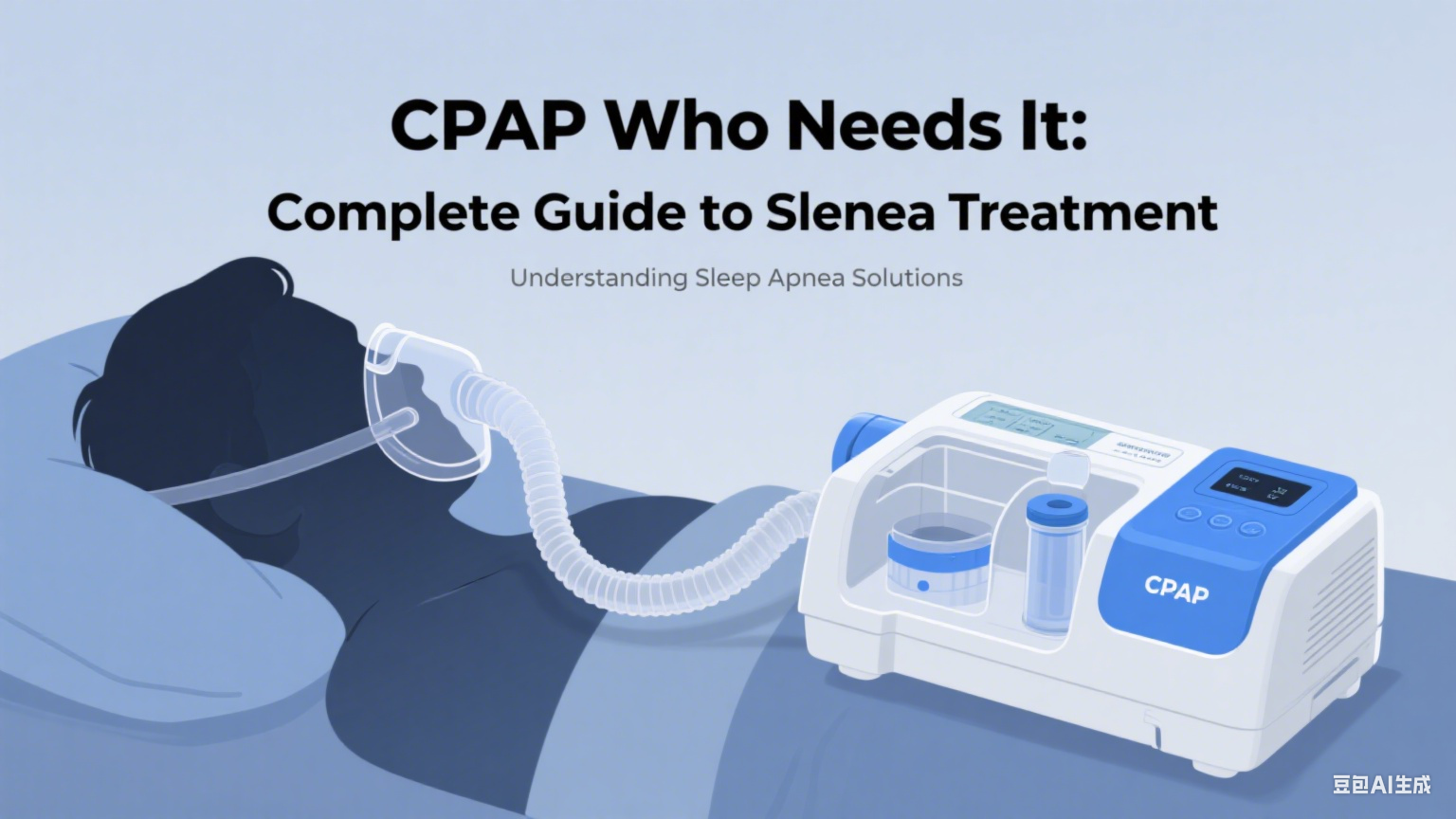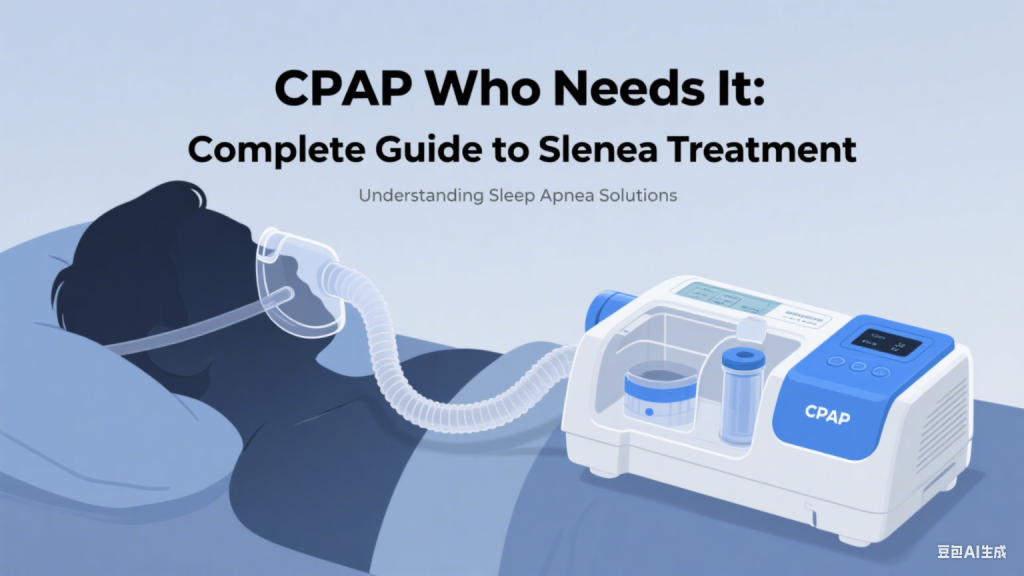CPAP Who Needs It: Complete Guide to Sleep Apnea Treatment


Sleep apnea is a condition that silently disrupts millions of lives worldwide. Loud snoring, restless nights, and constant daytime fatigue are often brushed aside as “normal,” but they may signal a serious sleep disorder. One of the most effective treatments for this condition is the CPAP machine for sleep, which ensures uninterrupted breathing and a restful night. But the question remains: CPAP—who really needs it?
Understanding CPAP Therapy
What is a CPAP Machine for Sleep?
A CPAP (Continuous Positive Airway Pressure) machine is a medical device designed to keep the airway open throughout the night. It works by delivering a steady stream of pressurized air through a mask, preventing the airway from collapsing. This technology has become the gold standard for treating obstructive sleep apnea.
How Does CPAP Work?
When someone with sleep apnea falls asleep, their throat muscles relax excessively, causing airflow blockages. The CPAP machine acts like an air splint, keeping the airway open and allowing normal breathing. This not only reduces snoring but also prevents dangerous oxygen drops during the night.
Who Really Needs a CPAP Machine?
Signs You Might Require CPAP Therapy
Not everyone with snoring needs CPAP therapy. However, if you experience:
- Gasping or choking during sleep
- Constant morning headaches
- Daytime drowsiness and lack of focus
- Loud, chronic snoring
…a doctor might recommend a CPAP machine for sleep after a proper sleep study.
Medical Conditions That Call for CPAP
CPAP is often prescribed for:
- Obstructive Sleep Apnea (OSA)
- Central Sleep Apnea (CSA)
- Complex Sleep Apnea Syndrome
- Severe snoring affecting oxygen intake
Risk Factors That Increase the Need
Certain factors make CPAP therapy more likely: obesity, smoking, alcohol use, nasal obstructions, and a family history of sleep apnea. Diagnosis usually involves an overnight sleep test to measure breathing interruptions.
Benefits of Using a CPAP Machine for Sleep
Restoring Normal Sleep Cycles
Patients often describe their first night with CPAP as life-changing. Instead of waking up dozens of times due to blocked breathing, they experience uninterrupted rest and proper REM cycles.
Long-Term Health Improvements
Untreated sleep apnea is linked to high blood pressure, stroke, and heart disease. Regular use of a CPAP machine for sleep reduces these risks dramatically.
Daytime Productivity and Energy
Better sleep means more energy, sharper focus, and improved mood during the day. Many patients notice an immediate boost in concentration and motivation.
Different Types of CPAP Machines
Fixed-Pressure CPAP
This classic version delivers one consistent air pressure all night, making it suitable for patients with stable apnea patterns.
BiPAP for Advanced Cases
BiPAP (Bilevel Positive Airway Pressure) provides two pressure levels—higher for inhaling, lower for exhaling. It’s ideal for patients with severe apnea or those who struggle with standard CPAP.
APAP for Comfort and Adaptability
APAP (Automatic Positive Airway Pressure) automatically adjusts airflow based on breathing patterns, offering maximum comfort for changing sleep positions.
Choosing the Right CPAP Mask
The effectiveness of a CPAP machine for sleep depends heavily on the type of mask chosen. Comfort, fit, and breathing style all play a role in selecting the right one.
Nasal Masks
These cover the nose only and are popular among patients who breathe naturally through their nose during sleep. They’re lightweight and less restrictive, but not ideal for mouth breathers.
Full-Face Masks
Covering both the mouth and nose, these masks are best for people who breathe through their mouths or suffer from frequent nasal congestion. Although slightly bulkier, they ensure consistent airflow.
Nasal Pillows
Minimal and lightweight, nasal pillow masks sit at the nostrils and provide direct airflow. They’re great for patients who dislike bulky masks but may cause nasal dryness over time.
Possible Side Effects and Solutions
While a CPAP machine for sleep is life-changing for many, some patients struggle with side effects. Fortunately, most issues have simple fixes.
Mask Discomfort
Ill-fitting masks can cause skin irritation or air leaks. Adjusting straps or trying a different mask type often solves the problem.
Dryness and Congestion
The constant airflow can dry out the nose and throat. Using a heated humidifier attachment reduces this effect.
Tips to Adapt to CPAP Use
- Wear the mask for short periods during the day to get used to it.
- Use a ramp feature (if available) that starts with low pressure and gradually increases.
- Clean the mask and tubing regularly to maintain hygiene and comfort.
Caring for Your CPAP Machine for Sleep
Proper maintenance ensures long-lasting performance and prevents health risks like infections.
Cleaning and Hygiene
Daily cleaning of the mask and weekly cleaning of the tubing with mild soap and water keeps the system safe.
Replacing Parts Regularly
Filters, tubing, and cushions wear out over time. Replacing them every few months improves efficiency and hygiene.
Travel and Storage Considerations
Many CPAP machines now come in compact, travel-friendly versions. Store in a clean, dry place when not in use, and always carry a universal power adapter when traveling abroad.
Cost, Insurance, and Accessibility
Price Range of CPAP Machines
A standard CPAP machine for sleep typically ranges from $500 to $1,000. Advanced BiPAP or APAP devices can cost $1,200 or more.
Does Insurance Help Cover CPAP?
Most health insurance plans cover part or all of the cost if a doctor prescribes the device after a confirmed sleep study. Patients should check with their provider for specific terms.
Budget-Friendly Options
Some patients opt for refurbished machines or rental programs as a cost-saving measure. It’s important to ensure the device comes from a trusted supplier.
Alternatives for People Who Can’t Use CPAP
While CPAP therapy is the gold standard, it’s not the only solution.
Lifestyle Adjustments
Losing weight, reducing alcohol intake, and avoiding sedatives before bed can improve sleep apnea symptoms.
Dental Devices
Oral appliances reposition the jaw or tongue to keep the airway open. They’re less intrusive than CPAP but may not be effective for severe cases.
Surgical Treatments
Procedures such as uvulopalatopharyngoplasty (UPPP) or Inspire therapy (an implantable device) are options when CPAP is intolerable.
FAQs about CPAP Who Needs It
1. How do I know if I need a CPAP machine for sleep?
If you experience loud snoring, morning fatigue, or choking during sleep, a sleep study can confirm whether CPAP is necessary.
2. Can I stop using CPAP once I feel better?
No. Sleep apnea does not simply “go away.” CPAP must be used consistently unless your doctor advises otherwise.
3. Is CPAP therapy uncomfortable?
It may feel strange at first, but most patients adapt within a few weeks. Choosing the right mask helps.
4. Will I have to use a CPAP machine for sleep forever?
Not always. Some patients improve with weight loss or alternative therapies, but many rely on CPAP long-term.
5. Can children use CPAP therapy?
Yes, if prescribed by a pediatric sleep specialist. The settings and masks are adapted for smaller patients.
6. Is it safe to travel with a CPAP machine?
Yes. Travel-sized CPAPs are available, and airlines generally allow them as medical equipment.
Conclusion: Is CPAP the Right Choice for You?
So, CPAP—who needs it? The answer is clear: anyone diagnosed with moderate to severe sleep apnea, or those whose lives are disrupted by chronic breathing interruptions at night. A CPAP machine for sleep not only restores restful nights but also protects long-term health, reduces risks of serious diseases, and improves overall quality of life.
If you suspect sleep apnea, don’t wait—talk to your doctor and explore whether CPAP is the solution that can change your nights and days for the better.
















